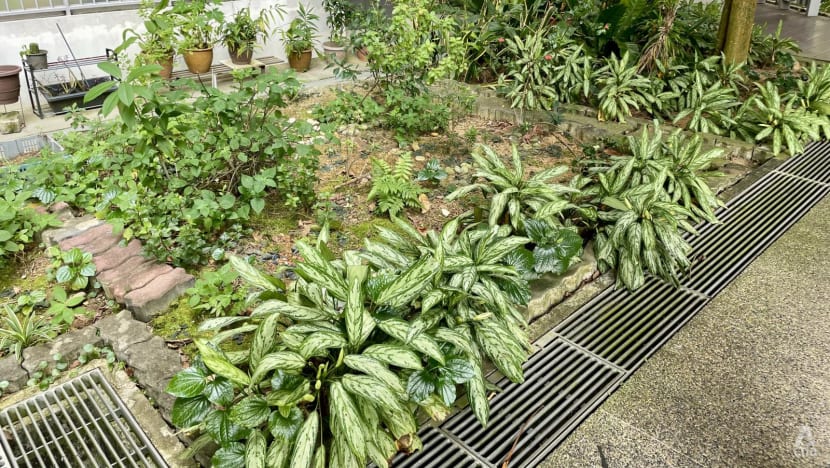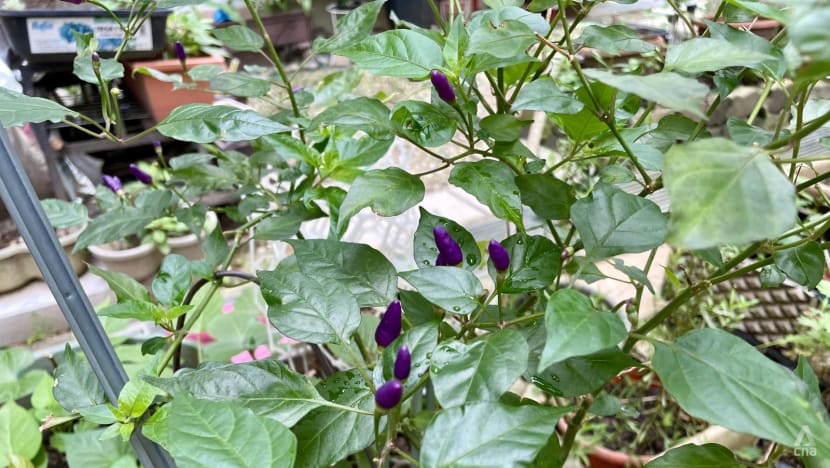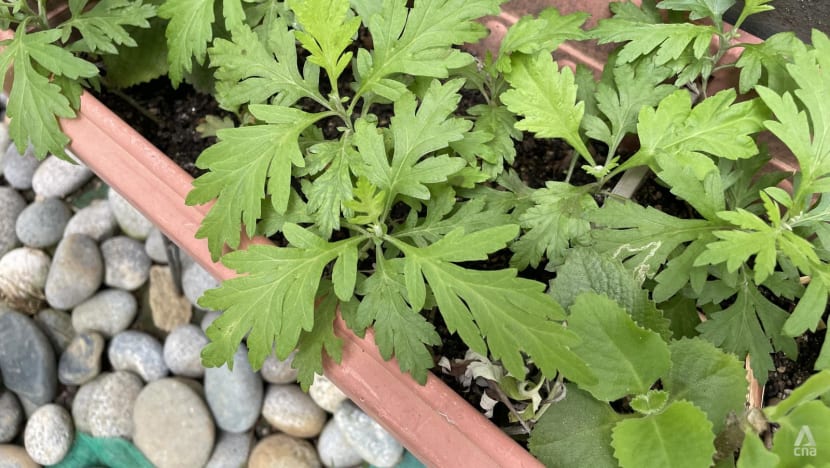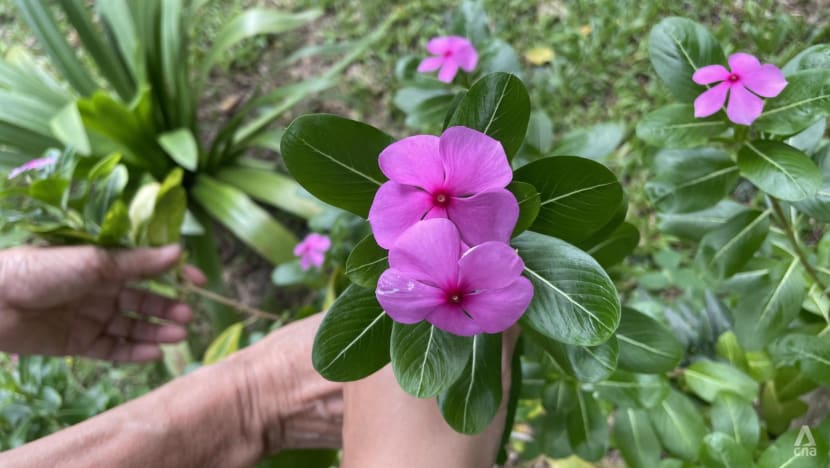Unauthorised plants dealt with on 'case by case basis': MPs
Earlier this month, CNA reported that Marine Parade Town Council had chopped down a few trees planted by a resident at an Aljunied HDB estate.

Plants in a common space at an HDB block. (Photo: CNA/Vanessa Lim)

This audio is generated by an AI tool.
SINGAPORE: Nestled in a quiet corner of a residential block in Toa Payoh sits a lush garden with potted plants arranged in neat rows.
With an area spanning at least 100 sq ft, the garden boasts a variety of herbs, flowers and vegetables growing from pots as well as from the ground.
They are the fruits of one resident’s labour. Mrs Ong has spent the past decade turning the grassy patch outside her ground-floor Housing and Development Board (HDB) unit into a tranquil spot for neighbours to learn about gardening as well as harvest edible plants for their consumption.
The resident, who did not want to give her full name and requested that her address be kept private, said her interest in gardening sprouted after she retired 10 years ago.
“I have always loved plants because I’m a kampung girl," she said.
"When I was working, I had no time to do this. Now that I’m retired, I can do it and it also helps me to stay active and go outside to enjoy the sunlight.”



However, her passion project was not without challenges. Mrs Ong described how stressed she was in the initial years as authorities frequently checked her plants and issued notices for her to remove them.
“In the first two years (after) I moved here, I planted a few flowers. But the authorities said I could not plant on HDB ground and that if I wanted to plant them, it would have to be in pots,” she said.
“Every month, they would come to inspect and then I would have to remove them. But when the government started giving out seeds to residents, the authorities relaxed a bit.”
This was during the COVID-19 pandemic, when the National Parks Board distributed free packets of seeds to households.
“They just told me to make sure I kept the area clean and to check that water wasn’t being collected in the pots or plates.”
It is a duty that Mrs Ong takes seriously, with the 70-year-old spending three to four hours a day tending to her plants, trimming the surrounding grass and picking up litter around the area.
The town council occasionally inspects her garden and asks her to remove some plants, she said.
“I understand that the town council is doing their duty, so I don’t want to make things difficult for them because they are just doing their job. So, I said I will cooperate with them and whatever is not (acceptable), I’ll take it away and if it’s too heavy for me to move them, I will ask if they or their workers can help me.”
SOME DISCRETION
While HDB residents are not allowed to plant in common areas, there is room for some discretion, Members of Parliament (MPs) told CNA. The issue came under the spotlight after CNA reported earlier this month that Marine Parade Town Council had chopped down a few trees planted by a resident at an Aljunied estate.
Mountbatten MP Lim Biow Chuan, whose ward is also managed by Marine Parade Town Council, said the town council exercises some discretion for smaller plants as long as the plants do not affect the residents or surroundings or damage the infrastructure.
However, he said this was discouraged as it could pose safety risks and divert resources from authorised projects and planned maintenance activities.
“The town council maintains a regular schedule and an official tree register to check the health of authorised trees and plants, ensuring proper pruning and minimising risks. However, this maintenance does not extend to unauthorised plantings,” he said.
“Unauthorised plantings might not have been assessed for safety and may pose risks to the residents of the estate. Thus, if an unauthorised tree branch falls off and injures a resident, who will take responsibility?” he added.
“For the safety of our residents, we would advise against the planting of any trees or plants in the turf area of HDB estates without the authorisation from the town council.”
Listen:
TO RETAIN OR REMOVE?
Similarly, Yio Chu Kang MP and vice-chairman of Ang Mo Kio Town Council Yip Hon Weng said his town council decides on a “case-by-case” basis whether to remove or retain unauthorised plants.
This depends on factors such as the risk of mosquito breeding, the type of plant, its location and the potential impact on surrounding infrastructure.
On whether such plants are only removed if residents complain, he said that while his town council takes complaints into account, its primary concern is the safety and well-being of the community.
“Unauthorised plantings that obstruct pathways, damage property, or pose safety risks are prioritised for removal. Conversely, plantings that enhance the environment without causing issues may be retained after careful evaluation,” he said.
He added that there have been instances where the town council retained such plants and incorporated them into their maintenance schedule.
Ang Mo Kio Town Council said three locations where previously unauthorised plants were found have been incorporated into the official residents' garden with inventory and maintenance schedule for residents to follow up. The garden is inspected monthly.
“We recognise the value that greenery adds to our living environment and strive to maintain a harmonious balance. Our goal is to ensure that all plantings, authorised or not, contribute positively to our community while adhering to safety and regulatory standards,” said Mr Yip.















